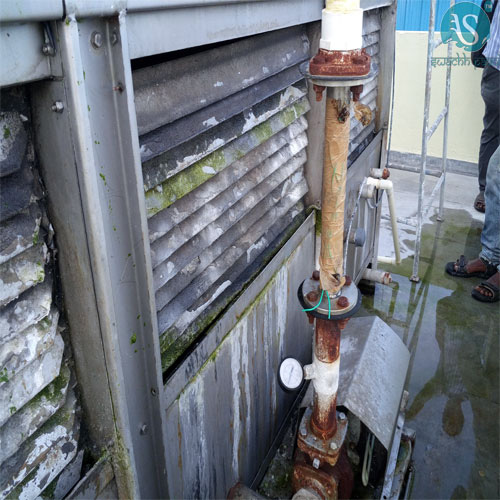Instant Solvent Softener for Cooling Towers in Industrial and Commercial Sectors

Introduction
Cooling towers are essential components in many industrial and commercial facilities, used extensively in sectors ranging from power generation to HVAC systems. However, one of the main challenges in cooling tower maintenance is dealing with hard water, which leads to mineral deposits and scaling. These issues reduce cooling efficiency, increase maintenance costs, and can even lead to costly shutdowns. The Instant Solvent Softener (ISS) offers a sustainable, cost-effective, and maintenance-free alternative to traditional water softening methods by addressing hard water issues without chemicals or salt.
This article dives into the specifics of ISS technology, how it works and benefits of Instant Solvent Softener for cooling towers applications in the industrial and commercial sectors, focusing on benefits, implementation, and the technology’s advantages over conventional water treatment systems.
Understanding Cooling Towers and the Impact of Water Hardness
Cooling towers dissipate heat by evaporating water, which draws heat away from industrial equipment or HVAC systems. This process requires a continuous supply of water. Hard water, which contains high concentrations of minerals such as calcium and magnesium, is a common problem in many regions and contributes to the buildup of mineral scale on surfaces and components in cooling towers.
Effects of Water Hardness in Cooling Towers
- Scaling: As hard water circulates through the cooling system, calcium and magnesium precipitate as insoluble carbonates. These deposits form scale, particularly on heat exchange surfaces, reducing the efficiency of heat transfer and leading to energy wastage.
- Increased Maintenance and Downtime: Scale buildup requires regular cleaning and, in severe cases, can lead to equipment damage and unexpected downtime. This translates into higher maintenance costs and can disrupt production in industrial facilities.
- Reduced Water Flow: Hard water can cause blockages in pipes and nozzles, leading to decreased water flow and uneven distribution within the cooling tower. Reduced water flow further diminishes cooling efficiency.
- Corrosion and Biofouling: Hard water often exacerbates the issue of biofouling, where biological matter such as algae and bacteria grow within the system. The presence of scale provides additional surfaces for biofilms to adhere, compounding maintenance issues and creating a breeding ground for potentially harmful microorganisms.
Introducing Instant Solvent Softener for Cooling Towers
The Instant Solvent Softener (ISS) from Parahsakthy Power Technologies is an innovative approach to water treatment that prevents scaling by modifying the physical properties of water without the use of chemicals or ion exchange. ISS works by generating physical fields or modified water flow patterns that alter the structure of minerals, reducing their ability to form scale on surfaces. This approach maintains the essential mineral content of the water, preserving its quality while ensuring that it does not cause scale buildup in equipment.
How ISS Works
ISS works by creating a controlled field that influences the molecular properties of water and the minerals dissolved within it. In the context of hard water, ISS encourages the formation of aragonite rather than calcite. Calcite is a crystalline form of calcium carbonate that adheres to surfaces, forming scale, while aragonite remains suspended in the water and does not settle on surfaces. Here’s how the process works:
- Generation of Physical Fields: ISS creates a non-invasive field that affects water molecules and dissolved minerals. This changes how these minerals behave, reducing their tendency to crystallize as scale.
- Prevention of Calcite Formation: The field produced by ISS disrupts the formation of calcite, which is the main component of scale. Instead, calcium carbonate and other minerals remain in a non-crystalline form, such as aragonite, which stays suspended in the water.
- Maintenance-Free and Chemical-Free: Since ISS does not rely on ion exchange, chemicals, or moving parts, it is virtually maintenance-free. It also does not introduce any additional substances into the water, making it an environmentally friendly solution.
ISS in Cooling Tower Applications
Cooling towers are particularly vulnerable to scale formation due to the continuous circulation of hard water, high temperatures, and the evaporation process. ISS provides several benefits specifically suited to cooling tower applications, ensuring efficient and long-lasting operation of cooling systems in industrial and commercial sectors.
Benefits of ISS in Cooling Towers
- Prevention of Scale Formation: By preventing scale, ISS allows cooling towers to operate at optimal efficiency. Scale can reduce cooling efficiency by up to 30%, leading to higher energy usage and increased operational costs. ISS prevents this, allowing for more effective heat dissipation.
- Reduced Need for Chemical Additives: Traditionally, cooling towers require chemical additives to control scaling, corrosion, and biological growth. ISS reduces or even eliminates the need for these chemicals, resulting in lower chemical costs and a more environmentally sustainable system.
- Enhanced Energy Efficiency: Scale acts as an insulator, reducing heat transfer and forcing systems to use more energy to achieve the same cooling effect. By preventing scale, ISS maintains efficient heat transfer, reducing energy consumption and greenhouse gas emissions associated with energy use.
- Extended Equipment Lifespan: Scale and biofouling accelerate wear and tear on cooling tower components, including pumps, pipes, and heat exchangers. ISS protects equipment from these issues, extending its lifespan and reducing the frequency of repairs or replacements.
- Consistent Water Flow: ISS minimizes clogging in pipes and nozzles, allowing for consistent water flow throughout the system. This ensures that all areas of the cooling tower receive sufficient water, promoting uniform cooling and reducing operational complications.
- Reduction of Biofilm Formation: ISS technology also addresses biofouling, which commonly occurs in conjunction with scale buildup. The non-crystalline form of minerals discourages the formation of biofilms on cooling tower surfaces, reducing the risk of microbial growth and associated health hazards.
Implementing Instant Solvent Softener in Industrial Cooling Towers
Integrating ISS technology into an existing or new cooling tower system requires minimal modification. ISS devices can be installed in-line, meaning they are placed within the water supply line of the cooling tower without disrupting water flow or requiring extensive setup.
Step-by-Step Installation Process
- System Assessment: First, conduct a water hardness analysis to determine the levels of calcium and magnesium in the supply. This helps optimize the positioning and operation of the ISS unit.
- In-Line Installation: The ISS unit is installed directly into the cooling tower’s water line. Its compact, plug-and-play design allows it to be easily fitted into most systems without the need for major modifications.
- Testing and Calibration: Once installed, the ISS unit is tested to ensure it’s generating the required field to modify mineral behavior. Some units may offer adjustable settings to tailor the strength and type of field based on water composition and flow rate.
- Monitoring Performance: Over time, monitor water quality, scale formation, and biofouling. With ISS, the water should remain free of scale deposits, and microbial growth should be minimized.
- Maintenance: ISS is generally maintenance-free, but periodic checks are recommended to ensure the unit remains in optimal working condition. Unlike chemical systems, there are no refills or replacement parts required, making maintenance simple and cost-effective.
Comparing ISS with Traditional Water Softening Methods
ISS provides a unique alternative to conventional water treatment methods used in cooling towers. Here’s a comparison to understand the advantages of ISS over traditional methods:
| Feature | Traditional Water Softeners | ISS Technology |
|---|---|---|
| Scaling Prevention | Moderate | High (prevents scale formation) |
| Chemical Requirement | High | None |
| Mineral Retention | No (removes calcium/magnesium) | Yes |
| Environmental Impact | Moderate to high (due to chemical use) | Low |
| Maintenance Requirement | High (regular salt or chemical refills) | Low |
| Biofilm Control | Moderate | High (prevents biofilm formation) |
| Installation Complexity | Moderate (may require plumbing adjustments) | Low (in-line, easy to install) |
Real-World Case Studies: Instant Solvent Softener for Cooling Towers
Case Study 1: Manufacturing Plant Cooling Tower
A large manufacturing plant struggled with scale buildup and frequent maintenance issues in its cooling tower. After installing ISS, the plant reported a 90% reduction in scale deposits, resulting in significant savings in maintenance costs and extended equipment life. Additionally, energy consumption for cooling decreased by 15% due to improved heat transfer efficiency.

Case Study 2: Commercial Office HVAC System
A commercial office building in a hard-water region installed ISS to prevent scale in its cooling tower system. Previously, the building relied on chemical softeners, which required monthly refills. With ISS, chemical costs were eliminated, and the office experienced uninterrupted cooling efficiency, with no scale-related downtime.
Case Study 3: Food Processing Facility
A food processing plant dealing with biofilm issues installed ISS to combat both scaling and microbial growth in its cooling towers. The ISS technology not only prevented scale but also significantly reduced biofilm formation, which had previously led to contamination risks. The plant saw improvements in water quality and a reduction in microbial counts, helping maintain food safety standards.

ISS as a Sustainable Solution
In today’s world, industries are increasingly under pressure to adopt sustainable and environmentally responsible practices. ISS technology aligns with these goals by providing a chemical-free, maintenance-free solution that not only protects equipment but also reduces the environmental impact of cooling tower operations. By eliminating the need for chemical softeners and reducing energy consumption, ISS contributes to a lower carbon footprint and promotes water quality without compromising efficiency.

